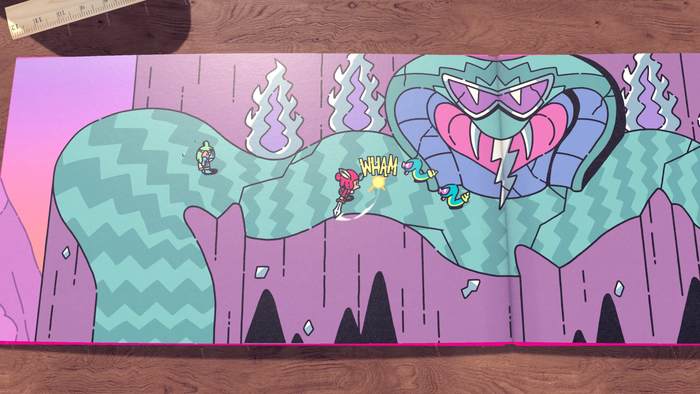Trending
Opinion: How will Project 2025 impact game developers?
The Heritage Foundation's manifesto for the possible next administration could do great harm to many, including large portions of the game development community.
"We always want to work with people who we see ourselves working with for years to come."

Devolver Digital reckons there's something in the water down under. The publisher has signed a platter of Australian productions in recent years–including Cult of the Lamb, Phantom Abyss, and The Plucky Squire–and was back in town for Melbourne International Games Week to see about adding to that portfolio.
During an energetic PAX Australia, we grabbed a few minutes with Devolver marketing manager Daniel Lucic to learn more about the company's current approach to publishing, its interest in Australia, and what makes for a winning pitch.
For Lucic, Devolver's interest in the Australian development scene is rooted in finding the right talent. He says the company isn't focused on any specific region, but rather follows the creativity–wherever that may be. "Obviously with the big success of Cult of the Lamb, which is developed by Massive Monster based here in Melbourne, we heard from them and other partners that there's a lot of talent here," adds Lucic.
Discussing how that partnership was formed, Lucic suggests signing Cult of the Lamb was an easy decision because the publisher quickly formed an emotional connection with the dev team. "Sometimes you get a pitch and you know immediately that this is it. Sometimes it takes more time, and sometimes it doesn't click–not because it's a bad game–but for other reasons," he explains. "This clicked immediately. We knew it was something special. Sometimes you get a really good game, but there's no emotional connection between you and the team and you don't want to work together. [...] We always want to work with people who we see ourselves working with for years to come."
Lucic notes that one of the major factors behind Devolver's continued flirtation with Aussie devs is the support and funding being dished out to creators and studios by government-backed organizations like VicScreen. "A bunch of us at the company really like the way [VicScreen] approach things and the way they build up the community and support them with funding and mentorship programs. They also help connect them with the right partner. [For instance] they had this one event where they told us 'we want to curate a few games that we see as a good fit for you.'" It's an approach to courting publishers that has evidently won over some of the decision makers at Devolver, and Lucic believes more markets would benefit from similar initiatives.
"I think it's very important that government bodies around the world support game developers, because there's so much money to be made in the industry for developers–but without that initial support it's very difficult for them to do so," he continues. "I know for a fact that in Croatia, where I'm from, we don't really have that support so a lot of our devs are struggling to find their feet. We do have something on a European Union level, but nothing that's super-effective within Croatia."
As we discuss the pitching session that Devolver was invited to attend, we ask Lucic what the company looks out for during a pitch. There's no secret one-size-fits-all formula when it comes to winning over publishers, but Lucic says there are certain ways developers can stand out. "For us, it's always about providing as much information as you can alongside really solid playable builds. When I say 'solid' I don't mean your build has to be super polished. The visuals don't need to be there, but as long as we can feel the core gameplay loop, that's when we're happy."

The Plucky Squire developer All Possible Futures was co-founded by Queensland-based industry veteran Jonathan Biddle
Lucic reiterates that every publisher will have its own idea about what they need to hear from developers, but suggests that "universally, everybody's looking to feel the hook when they play the actual build." He says you can have the best pitch deck in the world, but if your core mechanics are undercooked you're already fighting an uphill battle. "We're always going to read through the pitch, but really we just want to jump in and get a feel for it," he adds.
It's advice that ties into Lucic's belief that visibility is currently one of the biggest challenges facing developers. He suggests that, right now, creators are struggling to effectively surface their projects and notes that Devolver has even missed out on a a few titles it would liked to have signed over the years. "There are just so many games. You can see that right here at [PAX Australia] when you go to the indie section and there are 50 games and they're all cool in their own way. It's just hard to become visible," he says. The issue of visibility (or lack thereof) perhaps emphasizes the importance of Lucic's advice when it comes to pitching, and also his belief that governments should be doing more to help local studios cut through the noise.
As we prepare to wrap amid the hubbub of PAX, Lucic briefly touches on what the future might look like for Devolver. At this stage, you'd be forgiven for thinking the publisher is eyeing global domination, but Lucic personally wants the company stays true to its roots. "I hope we don't change much," he says. "We don't have to change a lot. We're signing great games and we're having fun working with developers. That's the most important thing for us. If we're having fun and the developers are having fun, and we're all making some money along the way, I think that's the dream."
Game Developer was invited to GCAP and Melbourne International Games Week by Creative Victoria, which covered flights and accommodation.
Read more about:
FeaturesYou May Also Like